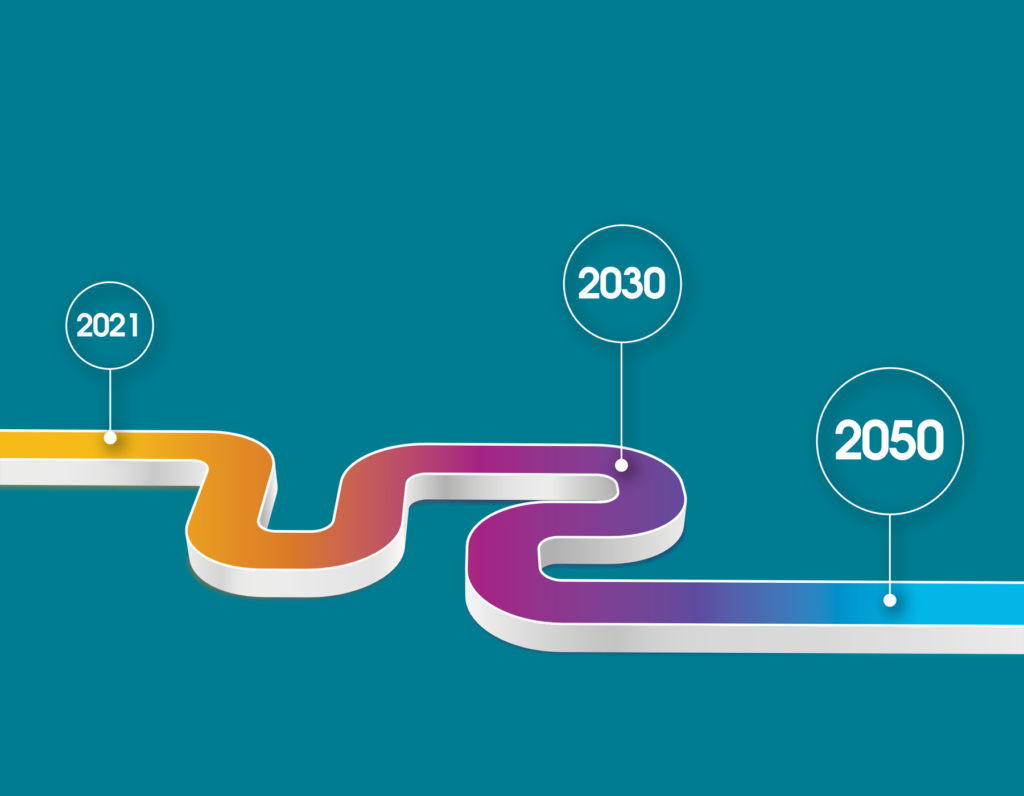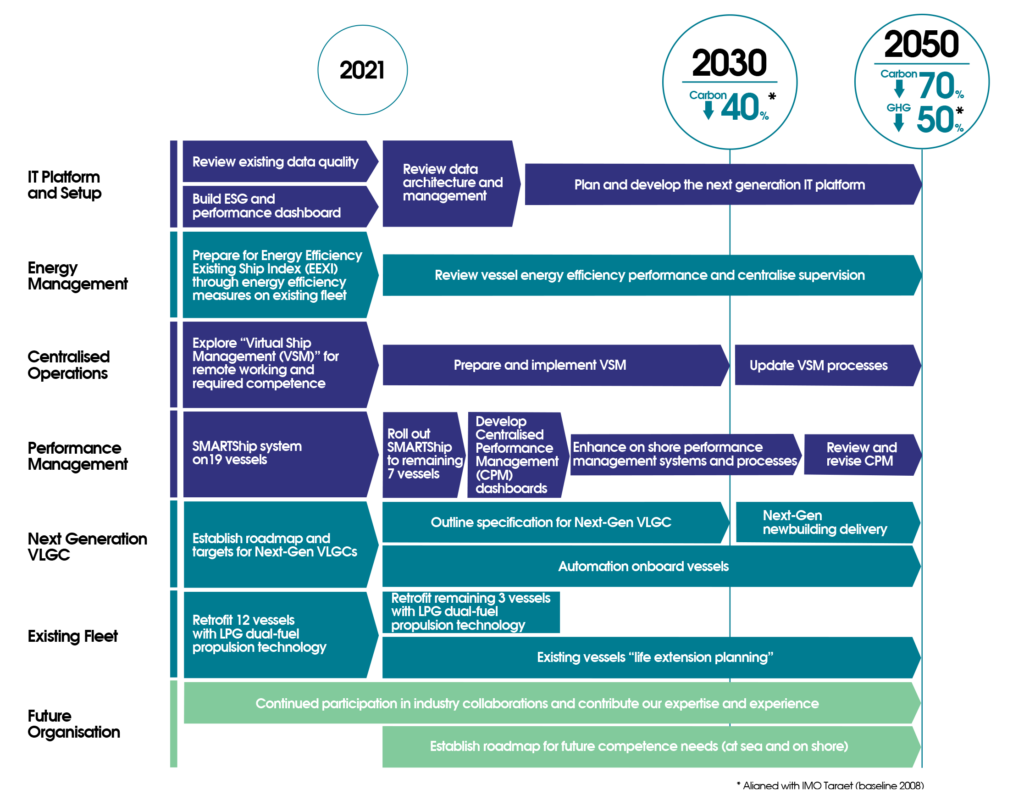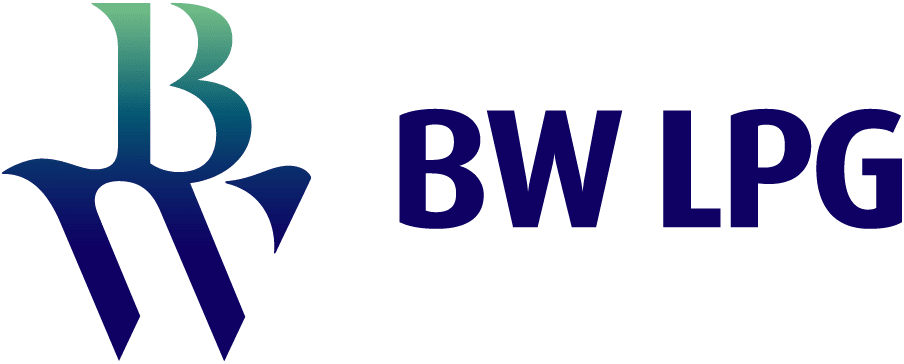Walking The Talk For Our Future

To commit to decarbonisation is to commit to a sea change in how we operate. At BW LPG, we are walking the talk – planning a long-term roadmap that not only protects the interests of our shareholders, but also positions us to seize opportunities from the global clean energy transition.
Our decarbonisation roadmap explores a spectrum of possibilities for action. From small initiatives such as replacing light bulbs with energy efficient LED lights, to more significant efforts that advance technological potentials of our existing vessels. On the latter, initiatives include installing technology that enhances voyage optimisation, retrofitting 15 VLGCs with pioneering LPG dual-fuel propulsion technology, and designing eco-centric future proof VLGCs by 2030.
Our multi-disciplinary ESG team explores technological, operational and market-based strategies to decarbonise operations. We provide quarterly updates of our environment-related investments and upgrades in our earnings presentations.
Beyond BW LPG, we collaborate with other stakeholders in our value chain, joining industry groups such as the Getting to Zero Coalition and leveraging on decarbonisation initiatives in the larger BW Group.
Our Actions
Decarbonisation Roadmap
Decarbonisation is a strategic imperative for our industry and our company. In 2021, we reviewed our KPIs, evaluated our priorities on the environmental front and established a pathway to translate our intentions into action.
Our Decarbonisation Roadmap illustrates how we plan to decarbonise operations. It is an important part of our strategy to mitigate risks that have been identified in our Enterprise Risk Management (ERM).
The Roadmap includes the following initiatives:
- Optimising our internal processes with automation and digitalisation
- Building centralised performance management dashboards
- Training and upskilling crew and employees
- Unlocking technological potentials of existing vessels and designing eco-centric future proof VLGCs
- Committing investments to operate new or retrofitted vessels capable of achieving net zero emissions, with the aim of achieving a carbon neutral fleet

Coperation and Research
We continue to invest in pioneering technology and R&D, and take an innovative approach to our maritime practices. We prioritise our efforts in the following areas:
- Improving vessel energy efficiency and performance
- Staying on top of latest developments in regulations, standards, and market trends
- Sharing of technical expertise with shipyards and providers of environmental solutions
| Type of Fuel | Pros | Cons |
|---|---|---|
| Biofuels | - Compatible with existing engines and fuel infrastructure - Close cost-parity with heavy fuel oil | - Emissions reduction calculation is complex - Long term scalability issues due to limited fuel resource and high costs |
| Hydrogen | - High-density energy source with good energy efficiency - Expected reduction in production cost in the next 10-15 years | - Compatibility challenge in internal combustion engines due to low volumetric density, high volatility and flammability - High fuel costs coupled with complex and unregulated storage and transportation |
| Ammonia | - Ease of storage with low fire and explosion risks - Technical compatibility for use in retrofitted LPG dual-fuel vessels | - Additional health and safety measures required due to toxicity - Significant investments required in fuel infrastructure |
| Methanol | - Higher chances of availability than ammonia in the short term - Regulatory standardisation by IMO is available | - Additional health and safety measures required due to toxicity - Limited availability and high sustainable fuel production costs |
| Synthetic Diesel | - Compatible with existing engines - No significant fuel infrastructure required | - Variable feedstock composition restricts standardisation of fuel - Limited availability and high sustainable fuel production costs |
| Potential Next-Gen Technologies | Highlights |
|---|---|
| Carbon Capture | Carbon Capture, Utilisation and Storage (CCUS) is considered to be a technically and economically viable method to lower GHG emissions from the combustion of conventional fuels. However, current CCUS methods cannot be used on ships due to the impact on the vessel’s performance. |
| Rotor Sails | Could allow a vessel to maintain the same speed with reduced engine power or increased vessel speed with the same engine power. However, intermittency could disrupt daily practices and operations of vessel. |
| Batteries | More economical and environmentally friendly approach to power vessels removes the need to constantly generate power; reducing the strain on vessel systems. But long freight distance makes access to charging infrastructure enroute a necessity; and developments are at a nascent stage. |
| Air Lubrication System | The air lubrication system reduces resistance between the sea and the vessel’s hull, increasing the vessel’s energy efficiency as a carpet of bubbles coats the full flat bottom of the vessel. Despite easy installation on new and existing vessels, high airflow rate is required to maintain the air layer and this works best on flat and horizontal sections of the hull. |
| Fuel Cells | Fuel cells are an alternative to batteries. However, conventional hydrogen fuel cells are limited in application as storage remains a big challenge. Alternatively, hydrogen can be stored in light chemicals such as ammonia and methanol where they are good indirect hydrogen storage materials and will not release carbon when used. |
We continue to explore the best combinations of technology and fuels for net-zero emissions in LPG shipping. Collaboration is the way forward – by working with partners such as engine manufacturers, environmental solution providers and fuel suppliers, we can progress towards a net-zero carbon future together.

